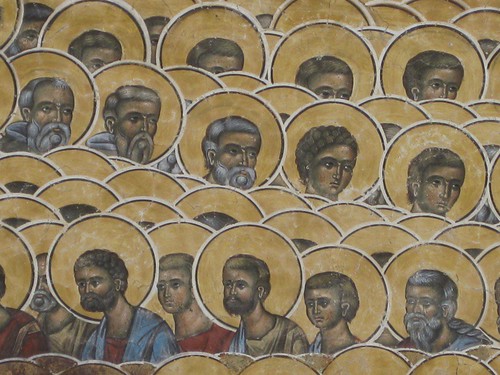
Christ Keeps Us From Sinning
Now to him who is able to keep you from stumbling and to present you blameless before the presence of his glory with great joy,to the only God, our Savior, through Jesus Christ our Lord, be glory, majesty, dominion, and authority, before all time and now and forever. Amen.
Jude 24-25
Day-by-day holiness is Jesus’ active obedience becoming our present obedience by the power of the Cross through the indwelling presence of the Holy Spirit. This is the Life of God in us: we trust the indwelling Christ who changes our hearts, thus producing right character in us leading to right conduct through us. Jesus Christ has brought us into union with a holy God. His holiness becomes our holiness by faith. His victory is our victory. Jesus’ victory over the world, the flesh, sin, death, and the devil is our victory over the world, the flesh, sin, death, and the devil. The resurrected Christ lives in us by the Holy Spirit: He who raised Jesus from the dead gives us life and that life is the freedom not to sin (Rom. 8:11).
Day-to-day holiness can be great acts of sacrifice and suffering, but normally consists of a thousand little choices of yielding self in the minute, daily, ordinary stuff of life. This holiness by faith is a resting confidence in “a trusted Christ†who renovates our hearts, purifies our spirit, uplifts our soul, and strengthens our inner man.  Jesus Christ in us adjusts our character choices, He strengthens us to do the right thing.
Total abstinence is the watchword of the Gospel about all sinning on the Christian’s part . . . . And now let us remember that for this total abstinence there is stored up in Him divine sufficiency. Yes, and we are in Him. The feeblest believer in this tent is in Jesus Christ, and Jesus Christ in the eternal covenant is in him. What we want is to turn the fact into practical realization; it is to turn what we have into what we use; it is to turn what we know into what we are. Look then, look off, look in, unto the Lord!
It is not manufactured within; it is derived from above; and it is derived in that most wonderful way–the embosoming of Jesus Christ in the very hearts of His own, by faith and by the Spirit . . . .
I will not think of the infinities of my need, except to lead me to the divine simplicity of the infinity of His supply. We are in Him; we derive it from Him. . . . I know what it is to lay the whole of it [i.e., besetting sin] upon my Lord’s head, and the whole of it beneath my Lord’s feet, and without anticipations of the future, to know that for the next step He is able to keep me from stumbling as well as hereafter, as He will, to present me faultless with exceeding joy (Jude 24-25).
Handley C. G. Moule, “The Total Abstinence of the Gospel,” Keswick’s Authentic Voice, ed., Herbert Stevenson (Grand Rapids, MI: Zondervan, 1959), 55.







